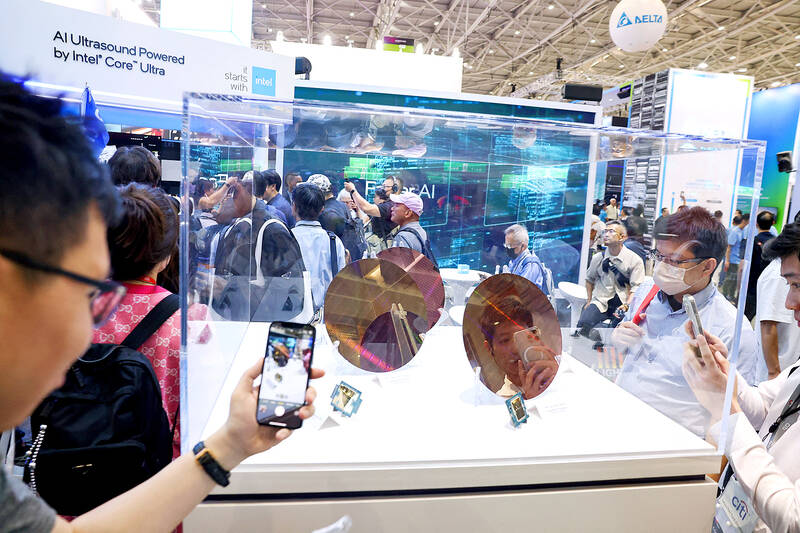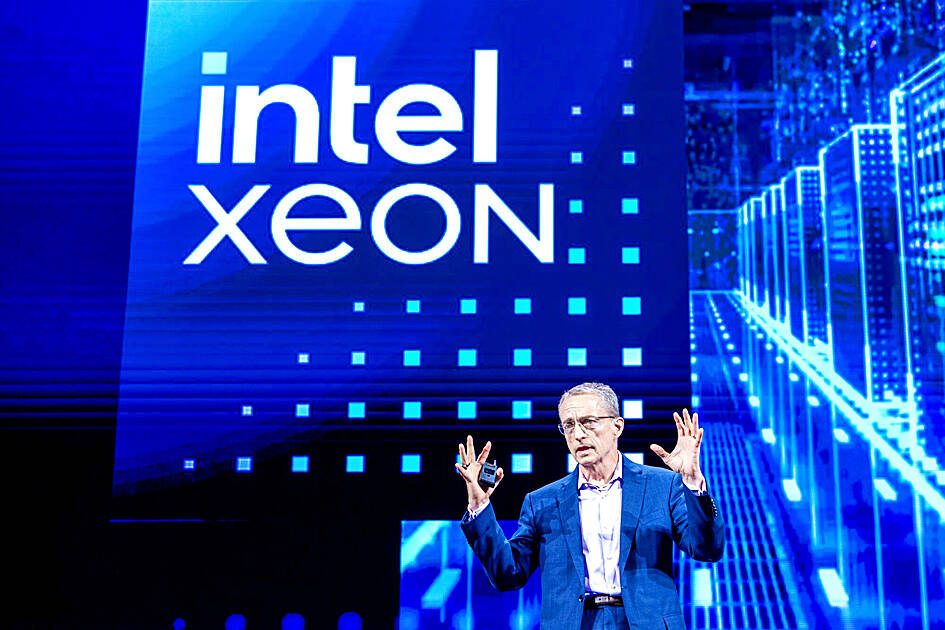US chip titan Intel Corp yesterday struck a defiant tone in the face of strong challenges from rivals Nvidia Corp, Advanced Micro Devices Inc (AMD) and Qualcomm Inc, unveiling technologies it said would lead the artificial intelligence (AI) revolution.
For decades, Intel has dominated the market for the chips that run everything from laptops to data centers. However, in recent years, its competitors, especially Nvidia, have soared ahead on specialized AI processors.
During a keynote speech at Computex Taipei, Intel CEO Pat Gelsinger introduced the company’s latest Xeon 6 processors for servers and shared more details about its next-gen Lunar Lake chips for AI PCs.

Photo: Cheng I-hwa, AFP
“AI is driving one of the most consequential eras of innovation the industry has ever seen,” Gelsinger said.
“The magic of silicon is once again enabling exponential advancements in computing that will push the boundaries of human potential and power the global economy for years to come,” he said.
Intel’s latest equipment provides the best available mix of performance, energy efficiency and affordability, he added.

Photo: Annabelle Chih, Bloomberg
Intel’s Gaudi systems — used for advanced AI work such as training models — would be one-third the cost of similar products from competitors, he claimed.
The Gaudi systems will be offered by partners like Dell Technologies Inc and Inventec Corp (英業達), he said.
“This is the most consequential time of our careers together,” Gelsinger said, reiterating the importance for Intel of working with its partners. “We were made for this moment.”
Gelsinger’s presentation followed earlier keynote speeches by Nvidia CEO Jensen Huang (黃仁勳), AMD CEO Lisa Su (蘇姿丰) and Qualcomm’s Cristiano Amon — and they were replete with claims and counterclaims about which firm’s products were best for AI.
Su and Amon gave detailed presentations on the chips their companies have developed for AI-enhanced PCs, after Microsoft last month unveiled its Copilot+ computers infused with AI features.
Gelsinger took a direct shot at Huang’s claim that traditional processors like Intel’s are running out of steam in the age of AI.
“Unlike what Jensen would have you believe, Moore’s Law is alive and well,” he said, adding that Intel would have a major role to play in the proliferation of AI as the leading provider of PC chips.
“I think of it like the Internet 25 years ago, it’s that big,” Gelsinger said. “We see this as the fuel that’s driving the semiconductor industry to reach US$1 trillion by the end of the decade.”
Gelsinger, in particular, rejected Qualcomm’s claim that its AI PC chips were better than Intel’s.
“I just want to put that to bed right now,” he said. “Ain’t true!”
AI computers are expected to be 80 percent of the PC market by 2028, Intel said, citing the Boston Consulting Group’s projections.
Additional reporting by Bloomberg

MULTIFACETED: A task force has analyzed possible scenarios and created responses to assist domestic industries in dealing with US tariffs, the economics minister said The Executive Yuan is tomorrow to announce countermeasures to US President Donald Trump’s planned reciprocal tariffs, although the details of the plan would not be made public until Monday next week, Minister of Economic Affairs J.W. Kuo (郭智輝) said yesterday. The Cabinet established an economic and trade task force in November last year to deal with US trade and tariff related issues, Kuo told reporters outside the legislature in Taipei. The task force has been analyzing and evaluating all kinds of scenarios to identify suitable responses and determine how best to assist domestic industries in managing the effects of Trump’s tariffs, he

TIGHT-LIPPED: UMC said it had no merger plans at the moment, after Nikkei Asia reported that the firm and GlobalFoundries were considering restarting merger talks United Microelectronics Corp (UMC, 聯電), the world’s No. 4 contract chipmaker, yesterday launched a new US$5 billion 12-inch chip factory in Singapore as part of its latest effort to diversify its manufacturing footprint amid growing geopolitical risks. The new factory, adjacent to UMC’s existing Singapore fab in the Pasir Res Wafer Fab Park, is scheduled to enter volume production next year, utilizing mature 22-nanometer and 28-nanometer process technologies, UMC said in a statement. The company plans to invest US$5 billion during the first phase of the new fab, which would have an installed capacity of 30,000 12-inch wafers per month, it said. The

Taiwan’s official purchasing managers’ index (PMI) last month rose 0.2 percentage points to 54.2, in a second consecutive month of expansion, thanks to front-loading demand intended to avoid potential US tariff hikes, the Chung-Hua Institution for Economic Research (CIER, 中華經濟研究院) said yesterday. While short-term demand appeared robust, uncertainties rose due to US President Donald Trump’s unpredictable trade policy, CIER president Lien Hsien-ming (連賢明) told a news conference in Taipei. Taiwan’s economy this year would be characterized by high-level fluctuations and the volatility would be wilder than most expect, Lien said Demand for electronics, particularly semiconductors, continues to benefit from US technology giants’ effort

‘SWASTICAR’: Tesla CEO Elon Musk’s close association with Donald Trump has prompted opponents to brand him a ‘Nazi’ and resulted in a dramatic drop in sales Demonstrators descended on Tesla Inc dealerships across the US, and in Europe and Canada on Saturday to protest company chief Elon Musk, who has amassed extraordinary power as a top adviser to US President Donald Trump. Waving signs with messages such as “Musk is stealing our money” and “Reclaim our country,” the protests largely took place peacefully following fiery episodes of vandalism on Tesla vehicles, dealerships and other facilities in recent weeks that US officials have denounced as terrorism. Hundreds rallied on Saturday outside the Tesla dealership in Manhattan. Some blasted Musk, the world’s richest man, while others demanded the shuttering of his